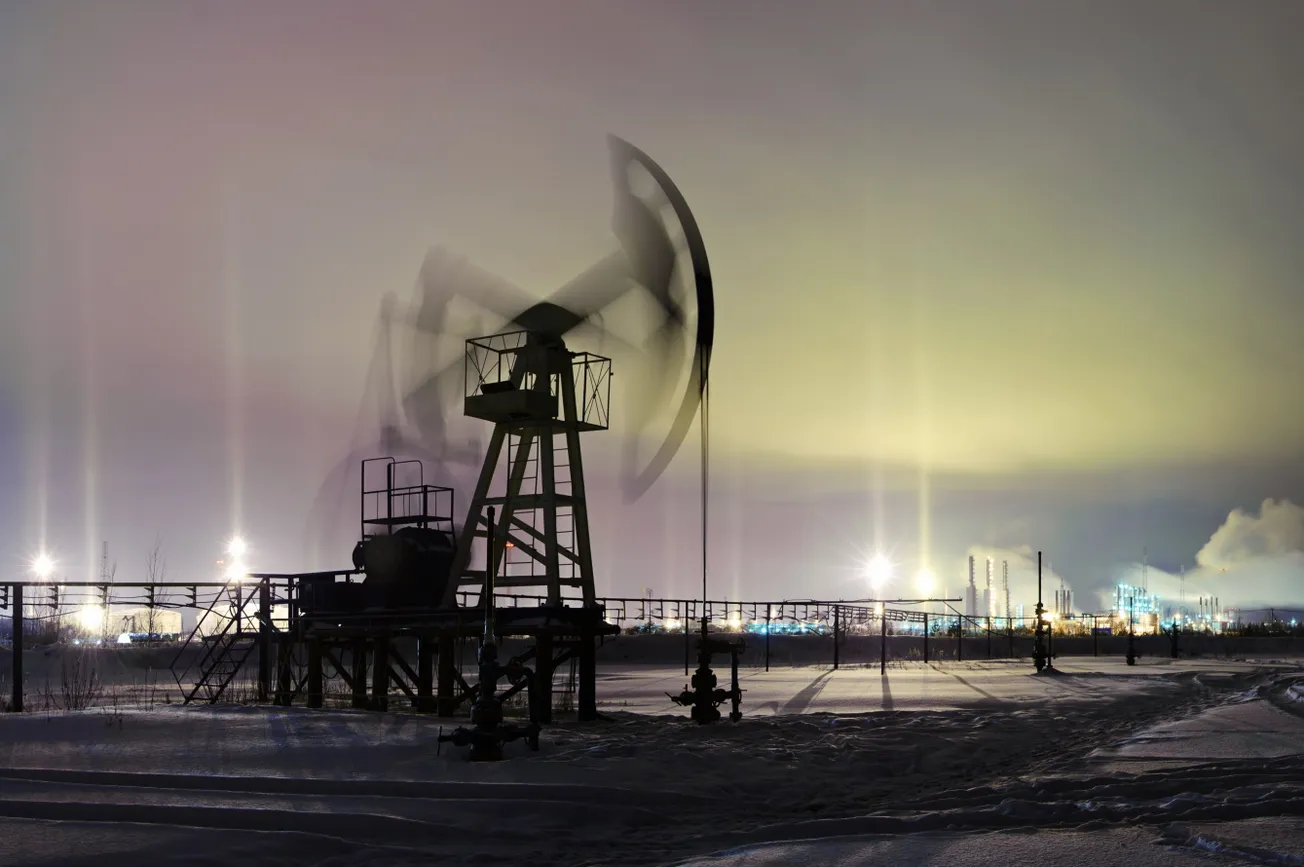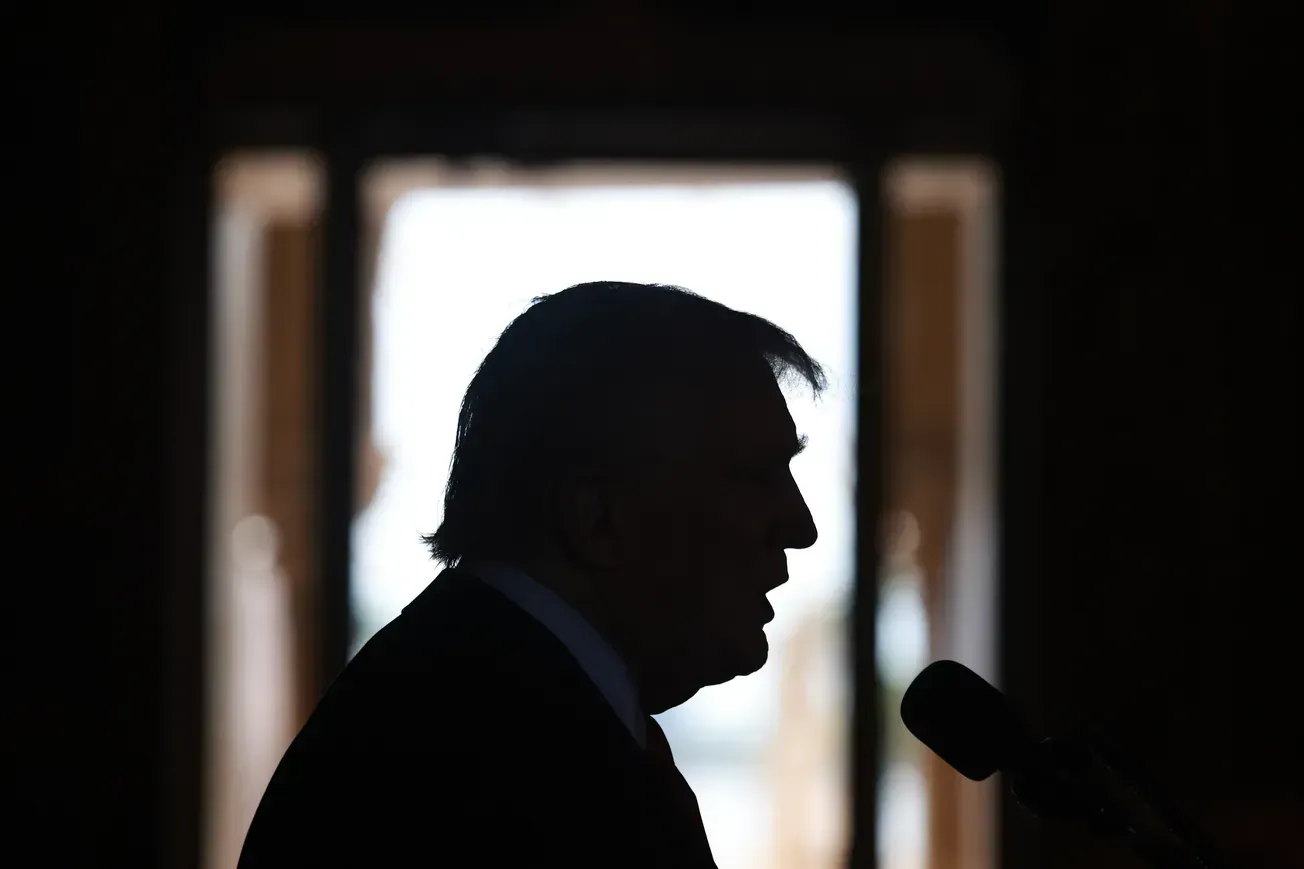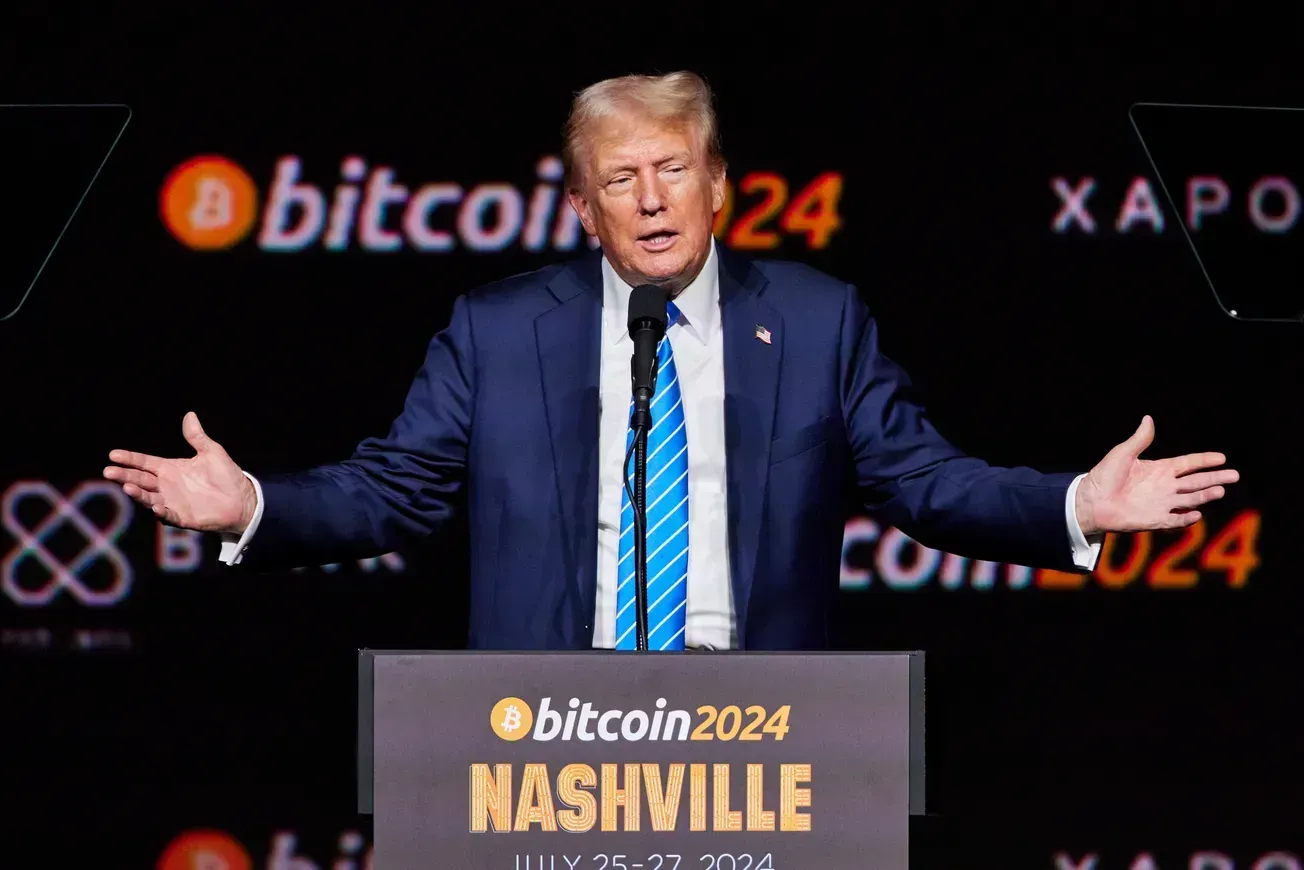With the holiday season upon us, the gift-giving and feasting seasons are also in full swing. But this year, Americans will find the prices they pay for holiday essentials higher than ever. Much of that is due to the soaring price of something we all take for granted: diesel fuel.
Diesel fuel prices are up roughly 50% from last year, in large part due to fast-dwindling supplies, affecting the cost of everything, including food, transportation, manufactured goods, even gifts. Ships use diesel fuel. So do trucks and trains. Desperate farmers need diesel to fuel their tractors and other farm equipment. It all adds up to higher costs.
Can something be done about this? Americans overwhelmingly answer yes, the latest I&I/TIPP Poll shows.
In the poll, we asked 1,359 adults the following question: "What should government do to alleviate the diesel shortage?" The online I&I/TIPP Poll, taken from Nov. 2-4, has a margin of error of +/-2.8 percentage points.
Respondents were given, in order, the following possible responses. Responses 1 to 4 were randomized to avoid any order bias:
- "Encourage more drilling and refining of oil."
- "Keep imposing strict limits on carbon-based fuels to reduce climate change."
- "Return to the rules and standards for energy production that prevailed in 2020."
- "Tax oil companies if they don’t produce more oil."
- "Do nothing."
- "Not sure
Americans mostly favored No. 1, encourage more drilling and refining of oil to boost diesel and other fuel supplies. It garnered an overall response of 39%. A close second, at 36%, was "Return to the rules and standards for energy production that prevailed in 2020."
Coming in a distant third, at 25%, was "tax oil companies if they don't produce more oil," followed by 22% who selected "keep imposing strict limits on carbon-based fuels to reduce climate change." The latter response tied with "not sure," also picked by 22% of respondents.
"Do nothing" was the least favored response, garnering just 3% from voters. Plainly, based on the polling data, Americans want government to do something and not just ignore the problem.
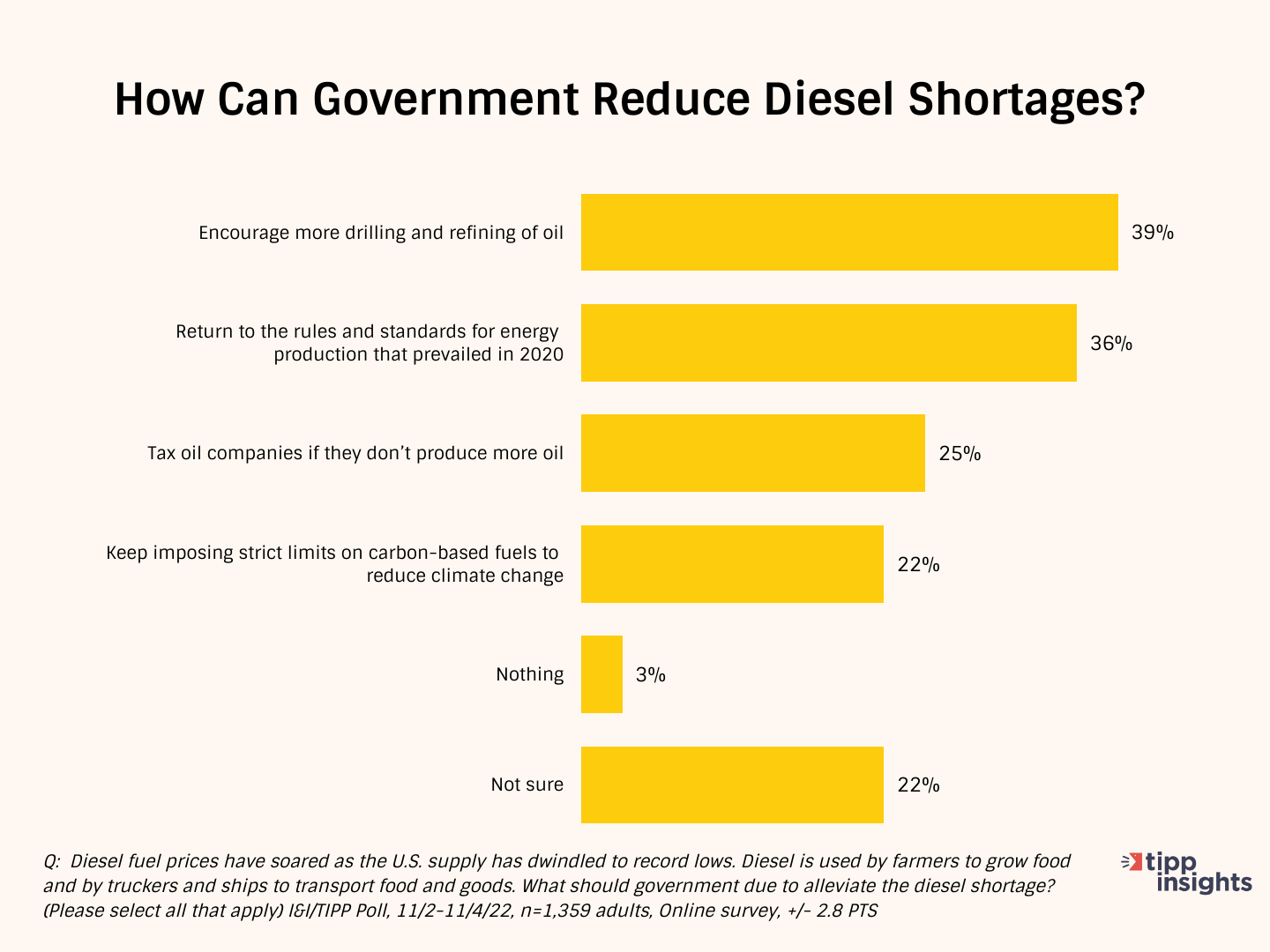
But once again, responses were marked by sharp differences when it comes to political affiliation and, perhaps surprisingly, gender.
Responses 1. and 3. above, which emphasized more oil production and returning to earlier, less-regulated oil production rules, were respectively favored by 55% and 51% of Republicans. Those policies were favored by just 30% and 28% of Democrats and 35% and 33% of independents.
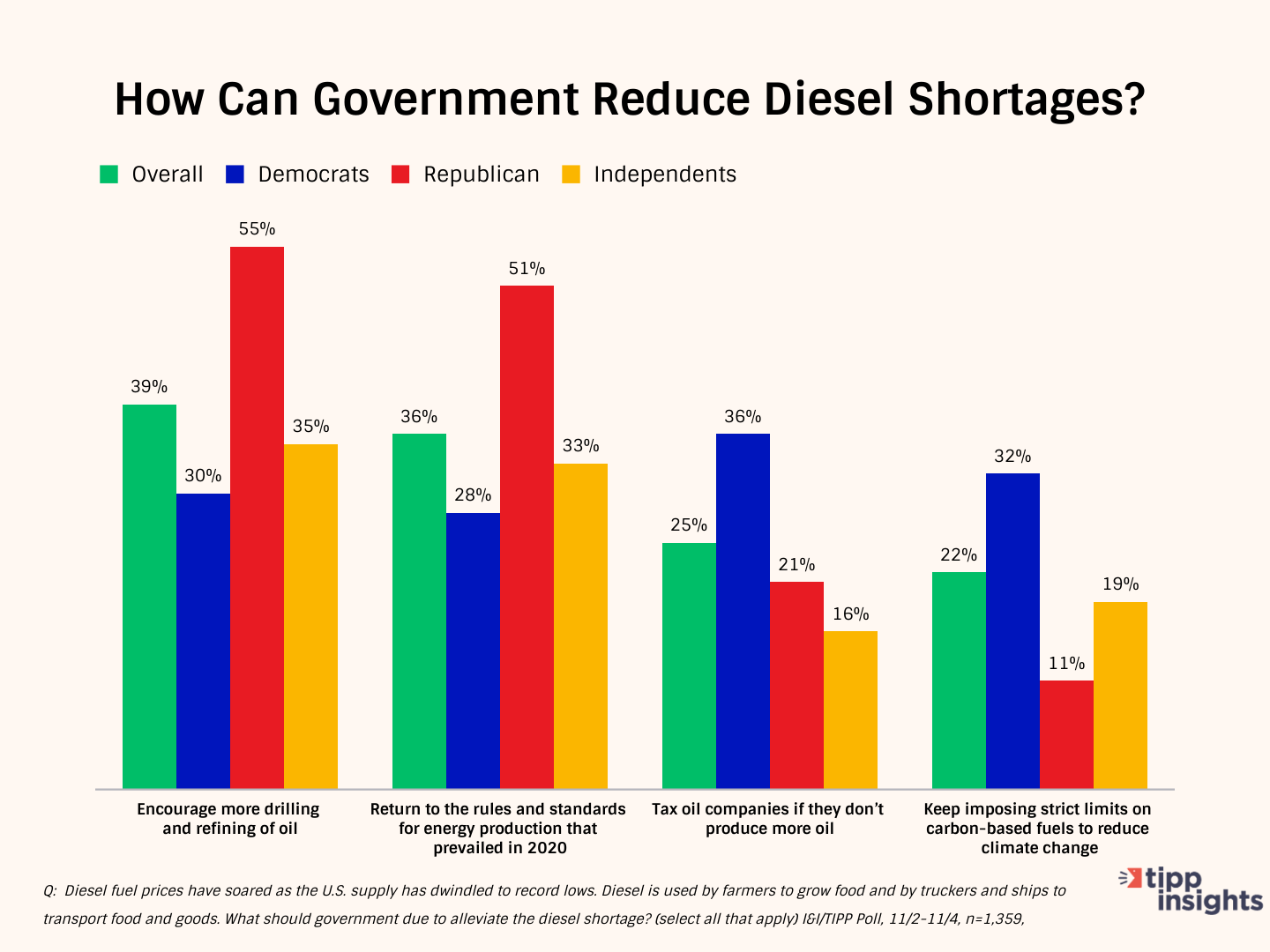
Meanwhile, responses that were more restrictive and punitive in nature, including No. 2 (continuing to place strict limits on carbon-based fuels in order to reduce climate change) and No.4 (tax companies that fail to produce more oil), gathered 36% and 32% of Democrats and 33% and 19% of independents. However, just 21% and 11% of Republicans supported those same two ideas.
By gender, men mostly favored No. 1 (44%) and No. 3 (42%), while women favored both those by a lesser amounts, 34% and 31%. Men also favored taxing oil companies (32%) by a large margin over women (19%). Men also were slightly more likely to support keeping strict limits on carbon-based fuels in place, at 24%, compared to 20% of women.
And women were far more likely to be "not sure" (28%) than men (14%).
The bigger political question might be: In addressing the worsening diesel crisis, do Americans most favor looser rules or more restrictive rules?
The answer transcends both politics and the short-term horizon of the holiday season. Indeed, the U.S. is already suffering slowing demand due to surging inflation for food, manufactured goods and, especially, energy.
It could get worse. As Bloomberg reported recently, "Within months, almost every region on the planet will face a danger of a diesel shortage just as supply crunches in nearly all the world's markets have worsened inflation and hurt growth."
Overall retail diesel prices per gallon have soared 94% since President Biden took office, rising from $2.696 a gallon just before the 2021 inauguration to $5.233 a gallon as of Nov. 21, according to the U.S. Energy Information Administration.
The number of days' supply of diesel on hand recently dropped to an all-time low of 25 days. That might sound like a lot, but it's an extraordinary level of market tightness that leads directly to higher prices.
Already, with inflation roaring, some 81% of families report they'll cut holiday gift spending this year, according to CRC Research.
Meanwhile, "Winter could exacerbate problems for the Northern Hemisphere as the worst diesel squeeze in a generation could wreak havoc on the already faltering global economy," ZeroHedge wrote recently.
A Bloomberg headline summed up the problem succinctly: "World's Most-Crucial Fuel Heads for Shortage Touching Everything".
With the real possibility of a rail strike looming, more pressure will be put on other users of diesel, especially big trucks, to transport goods. If the strike happens, major shortages loom, bringing sharply higher prices for anything that people use on a daily basis.
Worse, with snow cover in the Northern Hemisphere now at a 56-year high, an unexpectedly cold winter will send prices for all fuels soaring and prolong our energy agony.
As our poll shows, Americans favor pro-active answers to the very real problem of a shortage of diesel fuel. Namely, they want more production and fewer burdensome rules. They want a return of the 2020 status quo, when energy was much cheaper and far more plentiful.
Whoever wants to win the next election in 2024 should take heed. Soaring energy prices have been a common trigger for recession since 1973.
I&I/TIPP publishes timely, unique and informative data each month on topics of public interest. TIPP reputation for polling excellence comes from being the most accurate pollster for the past five presidential elections.
Terry Jones is an editor of Issues & Insights. His four decades of journalism experience include serving as national issues editor, economics editor, and editorial page editor for Investor’s Business Daily.
Hey, want to dig deeper? Download data from our store for free!
Dear Reader,
We thank you for your committed readership and would like to present you with a special holiday offer of a 50% discount on our annual membership. A subscription to our services will:
- Provide access to all of our articles at a lower price ($49.50 vs. $99) for the first year.
- Bring you thought-provoking editorials and explainers.
- Help us to keep you on top of Geopolitics and Geoeconomics.
- Help us fund timely polling to bring you critical data.
- Support independent, data-driven journalism.
- Qualify you for a 25% discount on all public opinion research conducted with the gold standard TIPP Poll.
This offer is only valid from 11/24/22 - 11/29/22. Click here to grab it now!
Happy Holidays!
Best wishes,
tippinsights team
Please email editor-tippinsights@technometrica.com

